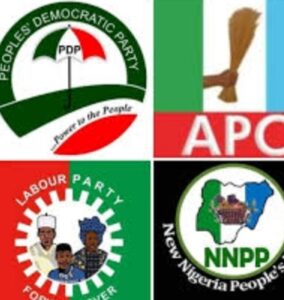Democracy at a Crossroads: Who’s Really to Blame for Nigeria’s Weak Opposition?
Democracy at a Crossroads: Who’s Really to Blame for Nigeria’s Weak Opposition?
By Temidayo Akinsuyi

Recently, a group of 17 prominent Nigerians—including human rights advocate Chidi Odinkalu, political scientist Prof. Adele Jinadu, former presidential adviser Babafemi Ojudu, and lawyer Richard Akinnola—issued a public warning to President Bola Ahmed Tinubu, expressing concern that the country may be veering toward a de facto one-party system.
Their statement, titled “Defending Democracy: A Call to Resist the March Toward a One-Party State in Nigeria,” accuses the Tinubu administration of systematically weakening Nigeria’s democratic fabric. They allege that tactics such as coercion, bribery, and intimidation are being used to erode opposition parties, leading to widespread defections to the ruling All Progressives Congress (APC).
In response, the presidency, through spokesperson Bayo Onanuga, dismissed the allegations as unfounded and politically motivated. Onanuga criticized the activists, labeling them hypocrites who celebrated when APC figures defected to opposition parties but are now outraged when the reverse happens. He argued that individuals joining the APC are simply exercising their democratic rights.
While Onanuga’s tone may have been harsh, he made a noteworthy point: the weakness of Nigeria’s opposition is largely self-inflicted. It’s not the president’s job to unite opposition parties or ensure
TRENDING SONGS
 NPMA Appeals to Nigerian Government for Compensation After Lagos Market Fire
NPMA Appeals to Nigerian Government for Compensation After Lagos Market Fire
 Rest Every Four Hours, FRSC Issues Safety Guide for Fasting Motorists
Rest Every Four Hours, FRSC Issues Safety Guide for Fasting Motorists
 NNPC Boss Ojulari Bags UK Energy Institute Fellowship
NNPC Boss Ojulari Bags UK Energy Institute Fellowship
 Shock in Anambra: Bride Disappears Moments Before Wedding
Shock in Anambra: Bride Disappears Moments Before Wedding
 Nigerian Woman Returns ₦330 Million Accidentally Credited to Her Account
Nigerian Woman Returns ₦330 Million Accidentally Credited to Her Account
 APC Don Reach Morocco?’ VeryDarkMan Reacts to Seyi Tinubu Poster
APC Don Reach Morocco?’ VeryDarkMan Reacts to Seyi Tinubu Poster
 Bride Breaks Down in Tears as Wedding Meals Were Kept Secretly While Guests Go Home Hungry
Bride Breaks Down in Tears as Wedding Meals Were Kept Secretly While Guests Go Home Hungry
 Odogwu by Day, Robber by Night: How Marriage Joy Turned Into Tragedy
Odogwu by Day, Robber by Night: How Marriage Joy Turned Into Tragedy
 Nigerian Officials Allegedly Pocket N4–6B Weekly Through Smuggling Cartels at Seme–Badagry Border
Nigerian Officials Allegedly Pocket N4–6B Weekly Through Smuggling Cartels at Seme–Badagry Border
 Ahmad Yerima: Naval Officer to Face No Sanctions After Clash with Wike – Matawalle
Ahmad Yerima: Naval Officer to Face No Sanctions After Clash with Wike – Matawalle
Share this post with your friends on ![]()













